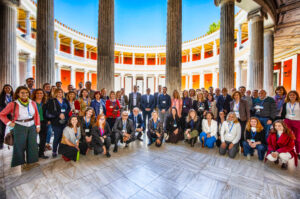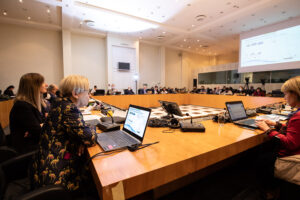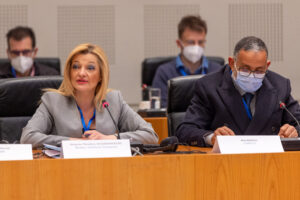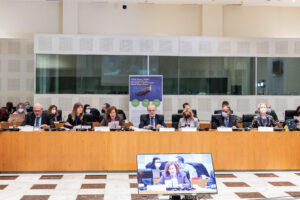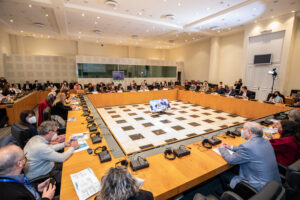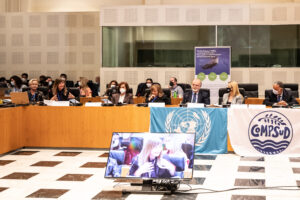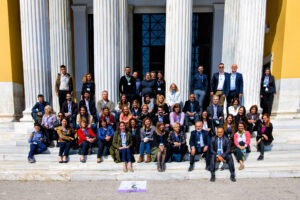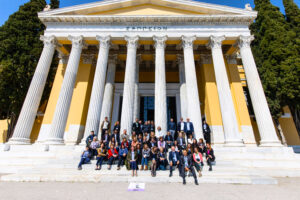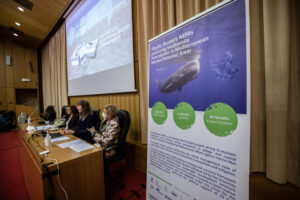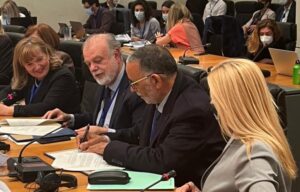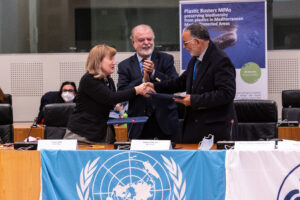More than 140 participants (105 in person; 35 online) from 14 Mediterranean countries came together at the Plastic Busters MPAs closing conference organized in Athens on 12-13 April 2022. The two-day event was emotionally charged since it brought together for the first time since the beginning of the pandemic, key marine litter actors of the region and many MPA managers. It was also the epilogue of the Plastic Busters MPAs project, featuring the knowledge, know-how, experiences and lessons learned obtained by the implementation of the demonstration and replication actions addressing the entire management cycle of marine litter, from monitoring and assessment to prevention and mitigation. The event was organised jointly by the Hellenic Ministry of Environment and Energy, MIO-ECSDE, UNISI and ISPRA, in cooperation with COMPSUD.
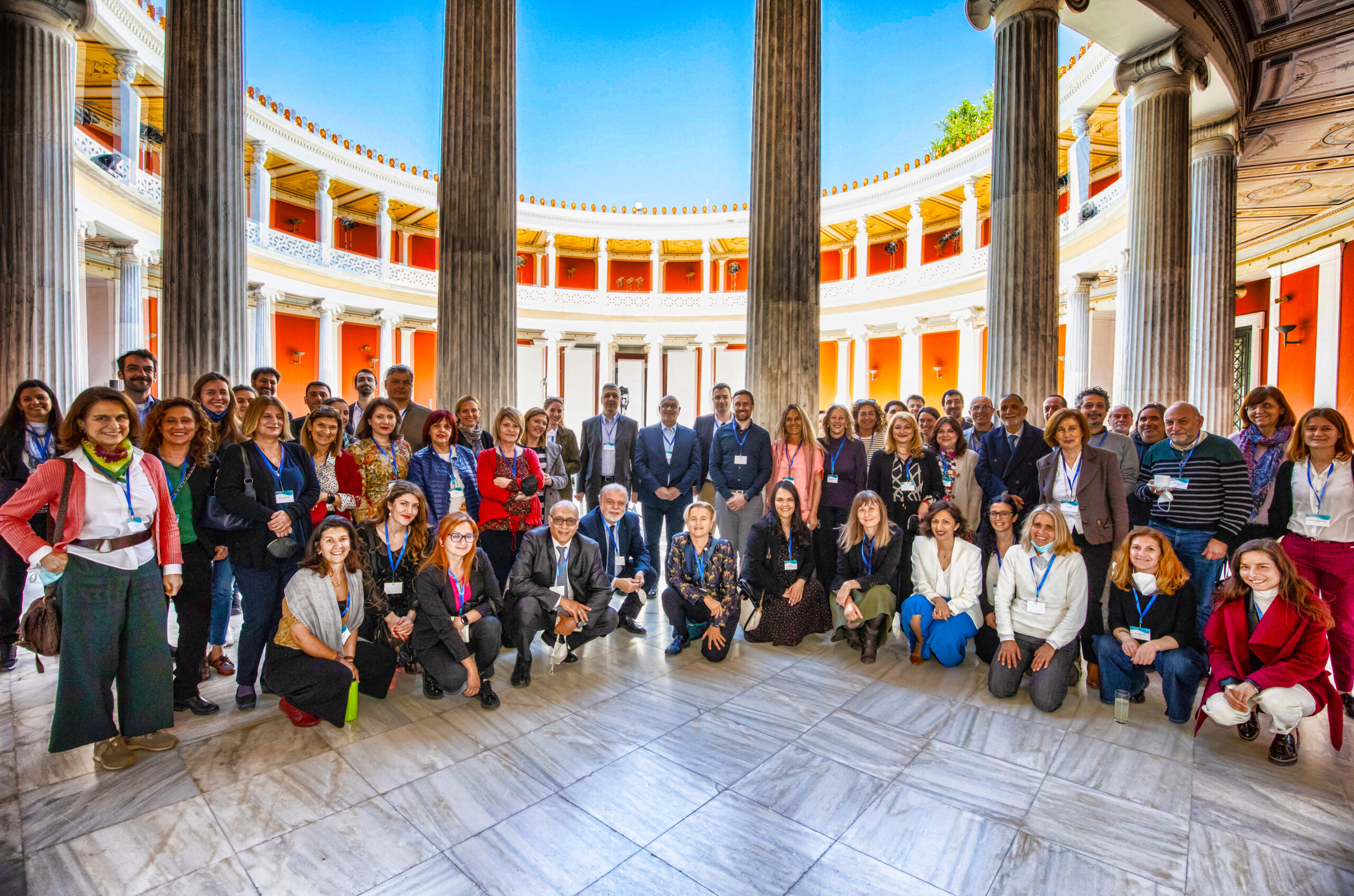
The event was opened by Dr. Dionysia-Theodora Avgerinopoulou, Member of the Hellenic Parliament, Chair of the Special Permanent Committee on Environmental Protection of the Hellenic Parliament and Vice-Chair of COMPSUD; Dr. Avgerinopoulou highlighted the significance of the Plastic Busters MPAs achievements, outcomes and recommendations and underlined that: “The role and responsibility of Parliaments, and elected officials such as myself, is significant in taking these recommendations and making them happen. But we need to work together throughout the region, and regional platforms such as the Circle of Mediterranean Parliamentarians for Sustainable Development, of which I am an active member, enables us to work in an informed and coordinated way.”
Prof. Moh Rejdali, Chairperson of COMPSUD, in his intervention acknowledged the great effort that was invested by the project team to deliver the expected project results despite all of the obstacles posed by the global pandemic and stressed: “For the members of COMPSUD, Parliamentarians from most Mediterranean countries with a genuine concern for the sustainable development of the region, evidence-based guidance on how to effectively address the marine plastic pollution challenge is highly needed. And projects such as Plastic Busters MPAs are doing exactly this by addressing the entire management cycle of marine litter and focusing on the science-policy-society interface.”
It has been almost 4 years since Plastic Busters MPAs started on its journey to address marine litter in Mediterranean MPAs and the project has achieved a lot: a first-of-its-kind comprehensive diagnostic analysis of the presence and effects of marine litter in Mediterranean MPAs; marine litter monitoring and assessment tools and approaches; showcases and guidelines of best practice measures, particularly focused on slashing single-use plastics in Mediterranean MPAs, and so much more.
Within the conference a high-level segment was held back-to-back with the signing of a Memorandum of Understanding between UNEP/MAP and COMPSUD aiming to foster bilateral cooperation for healthy marine and coastal ecosystems in the Mediterranean region (Read more here). Some of the key messages featured at the high-level segment were:
- MPAs stand at the forefront of the marine litter threat and urgent action is needed. All studied MPAs were characterized by high abundances of marine litter; indicatively beach litter densities were much higher than the European threshold value of 20 items per 100 metre stretch of coastline.
- MPAs are not powerless but can address the marine litter threat by directly operationalizing targeted prevention and mitigation measures. In fact, MPAs can serve as a unifying force and catalyst for change towards litter-free coasts and seas through the participatory elaboration and implementation of MPA-specific marine litter action plans.
- Tackling marine plastic pollution requires a ‘source to sink’ approach to decision-making, where the entire lifecycle of plastics is considered, from origin to “final” fate, and following it as it moves along environmental compartments.
- Reversing the cycle of decline of the coastal and marine environment requires a paradigm shift in our lifestyles and a transformation of the way we think and act. To this end ocean literacy and education for sustainable development are key!
- The prerequisites and enabling factors for effective social innovations that can deliver a paradigm shift in the way we produce and consume are: fit-for-purpose data, participatory decision-making and bottom up approaches, coordinated and multilevel actions, methodologically-sound and science-based processes.
The closing Plastic Busters MPAs conference and the overall project have been truly rewarding and inspiring experiences; a wealth of knowledge and know-how was generated and shared and this wouldn’t have been possible without the committed Plastic Busters team members who have worked hard in order to make the dream of a litter-free Mediterranean become eventually true!
The agenda and presentations of the conference are listed below.
Read in French here
The Plastic Busters MPAs final conference
Session #1
- Barcelona Convention policy advances on marine litter in the Mediterranean | Christos Ioakeimidis, UNEP/MAP
- EU policy advances on marine litter | Michail Papadoyannakis, EC DG ENVIRONMENT
- The Plastic Busters MPAs concerted actions to slash marine litter pollution in the Mediterranean: an overview | Cristina Fossi, UNISI & Thomais Vlachogianni, MIO-ECSDE
Session #2
- The Plastic Busters MPAs marine litter monitoring results and findings at the Pelagos Sanctuary (Italy) | Cristina Fossi, UNISI
- The Plastic Busters MPAs marine litter monitoring results and findings at Tuscany Archipelago National Park (Italy) | Cristina Panti, UNISI
- The Plastic Busters MPAs marine litter monitoring results and findings at Cabrera National Park (Spain) | Salud Deudero, IEO
- The Plastic Busters MPAs marine litter monitoring results and findings at the National Marine Park of Zakynthos (Greece) | Catherine Tsangaris, HCMR
Session #3
- Synthesis of the Plastic Busters MPAs marine litter monitoring and assessment results | Cristina Fossi, UNISI
- The Plastic Busters MPAs marine litter monitoring results and achievements at Brijuni National Park (Croatia) | Mirta Smodlaka, RUDJER BOSKOVIC INSTITUTE
- The Plastic Busters MPAs marine litter monitoring results and achievements at Capo Milazzo (Italy) | Michela Angiolillo, ISPRA
Session #4
- Synthesis of the Plastic Busters MPAs marine litter prevention and mitigation actions | Thomais Vlachogianni, MIO-ECSDE
- The Plastic Busters MPAs marine litter prevention and mitigation actions at Thermaikos Gulf Protected Areas (Greece) | Anastasia Charitou, iSEA
- The Plastic Busters MPAs marine litter prevention and mitigation actions at Landscape Park Strunjan & Debeli Rtic (Slovenia) | Petra Skrinjar, LANDSCAPE PARK STRUNJAN PUBLIC INSTITUTE
- The Plastic Busters MPAs marine litter prevention and mitigation actions at National Marine Park of Zakynthos (Greece) | Konstantinos Moschopoulos, NATIONAL MARINE PARK OF ZAKYNTHOS
- The Plastic Busters MPAs marine litter prevention and mitigation actions at Cabrera Archipelago Maritime-Terrestrial National Park (Spain) | Maria Francesca Lopez, CABRERA ARCHIPELAGO MARITIME-TERRESTRIAL NATIONAL PARK
Session #5
- Tackling marine litter: From policy to concrete actions | Ignasi Mateo, ARC-SCP/RAC
- The Plastic Busters MPAs marine litter prevention and mitigation actions at Cabo de Gata-Níjar Natural Park (Spain) | Gloria Garcia Hoyo, CABO DE GATA-NÍJAR NATURAL PARK
- The Plastic Busters MPAs marine litter prevention and mitigation actions at Miramare MPA (Italy) | Carlo Franzosini, MIRAMARE MPA
- The Plastic Busters MPAs marine litter prevention and mitigation actions at Ebro Delta National Park (Spain) | Xavier Abril Ferrer, EBRO DELTA NATIONAL PARK
- The Plastic Busters MPAs marine litter prevention and mitigation actions at Karaburun-Sazan MPA (Albania) | Elvana Ramaj, MINISTRY OF TOURISM AND ENVIRONMENT OF ALBANIA
